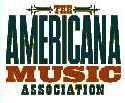 For those with very busy lives, the Americana Music Association has announced the dates for the 2012 Americana Music Festival 10 months in advance.
For those with very busy lives, the Americana Music Association has announced the dates for the 2012 Americana Music Festival 10 months in advance.
The Americana Music Conference and Festival is set for September 12-15, 2012 in Nashville. The 2011 event was possibly the best yet, with a terrific awards show (televised on WNPT and Austin City Limits) and an amazing celebration of the Muscle Shoals sound, with many of the original players.
From the Americana Music Association’s announcement: “The most significant increase in attendance took place at the conference portion of this year’s event, where industry professionals and artists gathered for a series of educational workshops and seminars. Peaking at over 1,130 attendees, a 25% gain over last year, registration for the conference has now increased by a staggering 35% since 2009. The 2011 Festival & Conference also stimulated a boost in new AMA memberships, with a 13% increase in members in the last 12 months. Membership now stands at 1356.”
That’s all good news for a genre that’s still trying to buid national awareness and broader recognition.
Concert review: Joe Ely at the Mint in Los Angeles
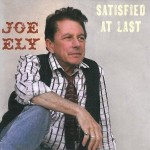 By Terry Roland
By Terry Roland
-It’s been a long four-year stretch without a solo Joe Ely show in Los Angeles. Our drought ended November 17th as he and supporting instrumentalist, Jeff Plankenhorn, made a rare appearance at L.A.’s famous club, The Mint.
The capacity crowd was treated to a 90 minutes-plus show, which included a rich set of songs, old and new. While his Flatlander friends are country-folk singers, Joe Ely is a born rocker. His stage presence was dynamic, even while his performance style has become more relaxed over the years. His vocal skills, both live and on record, are full of character, presence and the kind of soul that can inhabit country ballads and raw-to-the bone rockers with equal conviction.
Featuring songs from his new album, including the title track “Satisfied At Last,” Ely took the audience on a journey through his song catalogue that demonstrated the breadth and depth of his songwriting and performing ability.
Switching between acoustic lead guitar and slide dobro, Plankenhorn brought the kind of instrumental magic to the songs one usually expects to hear from Ry Cooder or David Lindley. He is that good. The exchange between the two brought a spontaneous feeling to much of the instrumental work, the kind you’d expect to hear from good jazz or blues. But Ely can bring this sensibility to the stage.
As he opened with the poetic and lyrical song of modern America, “Not That Much Has Changed,” he seemed like a reflective philosopher speaking to us from the front porch of his Lubbock home.
Other songs from the new album speak to mortality, the impermanence of life and our restless dance with trying to find meaning amidst its risks and dangers.
On the gospel-like “You Can Bet I’m Gone,” he sings “When I die don’t toll no bells/Just put my ashes in some shotgun shells/Get all of my friends some windy day to say goodbye/Watch me blow away.”
In contrast, his interpretation of Billy Joe and Eddy Shaver’s “Live Forever,” is as clear-eyed a look at death and the certainty of immortality delivered with a sweet immediacy. The rest of the songs performed included old ones, “I Had My Hopes Up High,” classics like “Billy The Kid,” and nods to his Flatlander pals, including Butch Hancock’s “If You Were A Bluebird.”
What remains unique about Ely both on stage and on record is his voice and stage presence. He calls up the country soul of a balladeer like Marty Robbins or the raw energy of a Buddy Holly rocker, while his lyrics reflect the Texas literature of Larry McMurtry and Cormac McCarthy.
Hearing this produced on record is one thing, but experiencing him bringing these elements to the concert stage is quite another. Once you’ve seen him perform you know you’ve experienced something unique, original and legendary, much like those who influenced him. This was the experience last Thursday at The Mint in L.A., where the audience reluctantly let him leave the stage after two encores.
Suzy Bogguss in concert at Country Music Hall of Fame
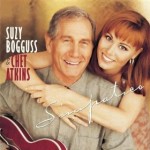 In 1994, Suzy Bogguss teamed up with legendary guitarist and producer Chet Atkins for the delightful Simpatico album.
In 1994, Suzy Bogguss teamed up with legendary guitarist and producer Chet Atkins for the delightful Simpatico album.
Bogguss will revisit that album and era in a concert at the Country Music Hall of Fame in Nashville at 2:30 p.m. on Dec. 10. The program is tied to the hall’s exhibit, “Chet Atkins: Certified Guitar Player.”
The Hall of Fame says Bogguss will perform her own hits, songs she recorded with Chet Atkins and holiday songs. The concert is free with admission to the Hall of Fame.
Tommy Womack: My three favorite Kinks songs
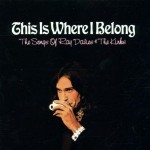 By Tommy Womack
By Tommy Womack
Bill Lloyd and I (with the trusty rhythm section from my band The Rush to Judgment – Dan Seymour and Justin Amaral) will grace you (if you deign to come) with a night of the Kinks at the Family Wash (Corner of Greenwood & Porter in East Nashvillw) on December 2nd. In honor of that noble undertaking, I’ve jotted thoughts on my three favorite Kinks tunes (at the moment) in the hope that, if you haven’t ever heard them, you’ll seek them out.
I find my three faves eschew the usual suspects: “You Really Got Me” (yawn), “Waterloo Sunset” (yawn) and “Lola” (triple yawn with a cherry on top). While I love those tunes, they routinely get their moments in the sun. Here are three that may or may not have drifted over your transom before.
“I Need You” (1965) – “YRGM” and “All Day & All of the Night” leave me cold sometimes now. Overexposure does that. “I Need You”, from the “Kinkdom” LP, has all their elements in spades, and 400 years later, it still sounds fresh.
What first drew me to the Kinks was not the charming tales of English life. That came later. It was those insanely catchy rocking riffs of the early days. After their first two hits, mentioned above, “I Need You” is third on the list of their early power chord masterpieces. First you have Dave Davies’ deliriously obnoxious Guild electric guitar through his El Pico amp with razor slits cut into the speaker cone and knitting needles stuck into a tube socket. Then you have that propulsive, infectious two-chord riff, tight as a tick with Pete Quaife on bass and Mick Avory punching the air with serious power.
The real star, however, is Ray Davies. Before being a lyricist with a poet’s touch, before writing those beautiful sophisticated melodies of years to come, Ray was already the preeminent massive talent in one facet that never gets mentioned: his profound grasp of laying down his voice in perfect rhythm with the track. His lyrics lay right with the drums. He’s the best rhythm singer in the world and I’ll stand on Elvis’s grave and say that. He’s better than Mick Jagger, better than John Lennon, better than Little Richard, better than even Chuck Berry. Before he was any of the things he later became, he was the best rhythm singer in the world. He still is. You can dance to his voice.
“Shangri-La” (1969) – At 5 ½ minutes, way longer than the average Kinks tune, with four different choral motifs, Ray skewered with a surgical lack of mercy the bland emptiness of a British middle class existence in houses that all look the same. If the Kinks had anything like a “Stairway to Heaven”, this one, epic in scope, building from quiet to Armageddon, is it. It’s even in the same key of A minor. Starting hauntingly in that second-saddest of all keys, as Ray begins by intoning “Now that you’ve found your paradise, here is your kingdom to command. You can go outside and polish your car, or sit by the fire in your Shangri-La”.
Enter the mournful horn section. Several minutes and three vignettes later, Dave kicks off a mean, Who-like slash-and-burn chordal onslaught and Ray lays it on the line, “All the houses on the street have got a name, ‘cause all the houses on the street they look the look the same…the gas bills and the water mains, payments on the car. Too scared to think how insecure you are. Life ain’t so happy in your little Shangri-La!”
Appearing on their “comeback” album, Arthur or The Decline and Fall of the British Empire, “Shangri-La” inspired a flurry of protest letters to the BBC by thin-skinned middle-class Brits offended by this lyrical challenge to the staid and colorless English existence. The album, commissioned for a television drama, benefited from a production sheen probably germinated from a healthier budget than the Kinks had enjoyed on the records immediately prior to. It also sounds like their first 8-track recording, through a more modern mixing board that rounded the edges of their sound, producing a sonic leap not unlike the difference from The “White Album” and “Abbey Road” in the same time period. By the way, if it even needs to be said, “Shangri-La” more than holds its own against anything the fabs were doing. You might even say it packs the whole second side of “Abbey Road” boiled down to a tighter rocking package.
“All of My Friends Were There” (1968) – With hokey music hall oom-pah verses and a gorgeous, delicate, soaring chorus, this might be the funniest song Ray has ever penned. It is a tale of him drinking too much before a prestigious gig. “My big day, it was the biggest day of my life. It was the summit of my long career, but I felt so down and I drank too much beer. The management said that I shouldn’t appear.” Mortified in retrospect, Ray then dons a disguise and sings “I wore a moustache and I parted my hair, and gave the impression that I did not care, but oh, the embarrassment, oh, the despair!” Offered a shot at redemption the next week, “I nervously mounted the stage once again, got through my performance and no one complained. Thank God I can go back to normal again.”
This gem appears on the second side of “The Village Green Preservation Society”, which Creem magazine once cited as “arguably the best album anyone’s ever made.” I tend to agree with that. In my freshman year of college, that record was my best friend. I love it so much I’m going to buy it something to eat.
So there are my three Kinks favorites – at the moment. I hope you can fit it into your schedule to come see me and Bill Lloyd celebrate the music of the Kinks at the Family Wash in East Nashville at 9 PM on December 2nd.
God Save The Kinks.
(Tommy Womack’s new album “Now What!” is due in January. His Kinks history includes a recording of “Picture Book” with Bill Lloyd on the Ray Davies tribute album This is Where I Belong.
Review: Kentucky Headhunters’ “Dixie Lullabies”
 By Ken Paulson
By Ken Paulson
– A sense of humor has always set the Kentucky Headhunters apart from other Southern rock bands. While others swaggered, the Headhunters did what they pleased, including covers of “The Ballad of Davy Crockett” and “Spirit in the Sky.”
The Kentucky Headhunters are back with Dixie Lullabies (Red Dirt Music), a new album that’s as loose, derivative and as entertaining as the rest of their catalog.
“It’s time to get our rocks off, mama, swing from the chandelier…” is the poetry that kicks off the album, mining the Georgia Satellites before channeling ZZ Top on “Boone’s Farm Boogie.”
Then comes “Great Acoustics” and a melody that echoes Eric Clapton’s “Let It Rain.”
And so it goes: familiar sounds played with energy and a sense of fun.
You listen to the Kentucky Headhunters for the party, not profundity. On Dixie Lullabies, they deliver.
Video: Civil Wars at the Americana Music Festival
The 2011 Americana Music Festival awards show will be aired on Austin City Limits beginning Nov. 19. Here’s one of the evening’s highlights, a riveting performance of “Barton Hollow” by the Civil Wars.
F
The Civil Wars “Barton Hollow” from Austin City Limits on Vimeo.
Chris Isaak, Dale Watson celebrate Sun Records
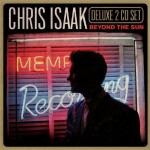 Given this site’s obvious affection for Sun Records, it’s heartening – and a little astounding – to see two albums on the Americana Music Chart pay tribute to the label. Dale Watson and the Texas Two are at #25 with “The Sun Sessions” and Chris Isaak breaks in at #31 this week with the two-CD “Beyond the Sun.” The music is more than half a century old, but still sounds vibrant.
Given this site’s obvious affection for Sun Records, it’s heartening – and a little astounding – to see two albums on the Americana Music Chart pay tribute to the label. Dale Watson and the Texas Two are at #25 with “The Sun Sessions” and Chris Isaak breaks in at #31 this week with the two-CD “Beyond the Sun.” The music is more than half a century old, but still sounds vibrant.
Other newcomers to the chart include Kathleen Edwards’ “Voyageur” at #26, HoneyHoney’s “Billy Jack” at #38 and the Infamous Stringdusters at #40.
At the very top of the chart, Ryan Adams’ “Ashes & Fire” displaces the Jayhawks at #1.
Recommended: Folkworks’ Josh White Jr. interview
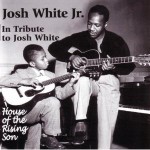 Terry Roland, a fine writer for Sun209.com, recently did a thought-provoking interview for Folkworks with Josh White Jr., son of the legendary and blacklisted folksinger . It appears that courage and compassion are in the Whites’ DNA.
Terry Roland, a fine writer for Sun209.com, recently did a thought-provoking interview for Folkworks with Josh White Jr., son of the legendary and blacklisted folksinger . It appears that courage and compassion are in the Whites’ DNA.
You’ll want to read the entire interview, but we wanted to share Josh’s thoughts on how music can bring people together:
“I admire Nat King Cole because he could find appeal with black and white audiences. My dad did the same thing. And the more I sang, the more my mind went toward what things bring us together. It was in the music. Anywhere he went, my old man could always find a song. He started at the age of seven by leading blind black blues singers through the streets to perform. He saw his father murdered just before that. All of that could have made him a very angry black person. But, he didn’t do it. He didn’t have an education. He couldn’t express things in speaking but he could find a song. We can always find music to express our feelings. Or to sing the feelings of those who don’t have a voice. That’s what feels good about what I do. I touch minds and hearts.”
Review: This One’s For Him, A Tribute to Guy Clark
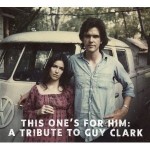 by Terry Roland
by Terry Roland
– Released on November 8, two days after veteran Texas songwriter Guy Clark’s 70th birthday, This One’s For Him: A Tribute To Guy Clark, succeeds beyond expectations as a tribute to a much- loved songwriter and a well-produced album of finely crafted country-folk music.
It may be the mark of a great songwriter that a diverse group of musicians can make an album of songs that not only capture the artist’s vision, but emerge with each song realized to near perfection.
Produced by Tamara Saviano whose 2004 release, Beautiful Dreamer: The Songs of Stephen Foster, won a GRAMMY and Clark’s friend and collaborator Shawn Camp, this is a masterfully produced album of 30 handpicked songs by 33 of today’s finest Americana artists.
Some of the greatest of the singer-songwriters of the last five decades have aged into their craft, but none have done so with as much grace, dignity and imagination as Guy Clark. His legacy of song gives his friends plenty of material to work with on this album.
Leading off with a chuckle from Rodney Crowell who says, “let’s give her a good go and make old Guy proud of us,” then proceeds to do so with the opening “Old Time Feeling.” The song sets us up for what is to come; a loving, reflective, funny, heartfelt tribute to one of the great storytellers and craftsmen of American song.
What follows plays at times like short stories, fragments of chapters in a novel, sweet poetry, western stories, tall-tales, cowboy haikus, personal testaments, musings and meditations on regret and joy, life-lessons laced with humor and wisdom, characters of the past aged with grace, remembered loved ones, death songs
and love ballads, all painted with various shades and strokes of lyrical colors.
If this were an exhibit of the lifetime work of a visual artist, it would take several galleries to fill. As it is, it takes this many fine performers and singer-songwriters to do justice to Clark.
The trick with any tribute album is to match material and artist, for the sake of the song and the overall production of the project. Many past tribute albums have turned into well-intentioned, unfocused failures.
But This One’s For Him avoids those traps by tapping into Guy Clark’s original recordings. The album embodies its title by keeping to the simple, intimate style Clark has mastered so well in his own studio work over the years.
It’s a style that allows the beauty of each song to surface. That makes this an anthology graced with continuity and a sense of history. This One’s For Him is the best album of its kind since the classic tribute to Merle Haggard, Tulare Dust.
A decade before Johnny Cash and Rick Rubin came together to make their historic American Recordings, Guy Clark had already released a series of live-in-studio, intimate, stripped-down acoustic recordings on the Sugar Hill label.
Albums like Old Friends, Boats To Build and Dublin Blues offered minimal production gloss in favor of a straightforward and organic sonic experience. While many obscure artists had championed this approach through the years, Guy Clark was among the first major songwriters to elevate purity over production.Today, this remains the gold standard in Americana music.
Some of the strongest moments on the album come from female artists. This makes sense for Clark who has often written songs reflecting a woman’s point of view (“She Ain’t Goin’ Nowhere,” “Magdeline”). Shawn Colvin’s smoky sexy reading of “All He Wants Is You,” Rosanne Cash’s expressive interpretation of “Better Days,” and Rosie Flores’ funky and spirited version of “Baby Took A Limo To Memphis,” all feel as though this was how these songs were intended to be performed – by women.
It’s impossible to mention Guy Clark without a reference to Townes Van Zandt. One touching moment among many is the bittersweet sound of Towne’s oldest son, John Townes Van Zandt narrating “Let Him Roll,” a love story about a Dallas prostitute and her alcoholic lover. It is eerie and touching to hear this tale with guitar- picking, phrasing and a vocal presence that sounds so much Townes. It feels like a tribute from Townes to Guy, channeled by his son.
Hayes Carll brings the country blues out in “Worry B Gone,” while Steve Earle revels in the western imagery of “The Last Gunfighter Ballad.” Both give the songs added grit, which distinguishes them from the original versions.
The old friends of Guy’s also do him proud. Willie Nelson’s “Desperados Waiting For A Train,” haunts in its simplicity. It’s a song that only grows more poignant with time as the singer and the song age.
Ramblin’ Jack Elliot turns in a gentle interpretation of the engaging “The Guitar.” Terry Allen’s “Old Friends,” also plays out with a beautiful country-blues simplicity.
Kris Kristofferson’s reading of “Hemingway’s Whiskey” delivers gut-level authenticity. The track opens with a short tale from Kris of a personal encounter with Hemingway then folds into a quintessential Guy Clark (literally whiskey-soaked) metaphor of life lived to its fullest. The slightly drunk emotion in Kris’ voice comes through as he carries the album’s title lyric with it:
There’s more to life than whiskey
more to words than rhyme
Sail away three sheets to the wind
Live hard, die hard
This one’s for him.
Other moments that will lure the listener to repeated listening include EmmyLou Harris and John Prine’s duet on “Magnolia Wind, Radney Foster’s smooth and easy version of “L.A. Freeway,” and Jerry Jeff Walker’s closing track “My Favorite Picture of You.”
The house band, which recorded live in the studio, included multi-instrumentalist and co-producer Shawn Camp, guitarist Verlon Thompson and keyboard player Jen Gunderman. Listen for Lloyd Maines on an array of dobros and steel guitars, bassists Glenn Fukunaga and Mike Bub and Kenny Malone and Larry Atamanuik on drums. The musical backing is skillfully interwoven with mandolins, lap steel guitars and fiddles.
This One’s For Him: A Tribute To Guy Clark is a living legacy from some very talented friends, a well-deserved tribute to a great craftsman and an early holiday present that invites us to discover or re-discover the best in Americana music through the songs of one of our national treasures.
(Terry Roland is an Americana-roots music journalist who has written interviews, reviews and feature articles for FolkWorks, Sing-Out, No Depression and The San Diego Troubadour.)
Wayne Carson to appear at Country Music Hall of Fame
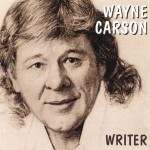 The career of songwriter Wayne Carson will be the focus of the Dec. 3 edition of “Poets and Prophets: Legendary Country Songwriters” at the Country Music Hall of Fame in Nashville.
The career of songwriter Wayne Carson will be the focus of the Dec. 3 edition of “Poets and Prophets: Legendary Country Songwriters” at the Country Music Hall of Fame in Nashville.
Carson co-wrote the classic “Always on My Mind” and “She’s Actin’ Single (I’m Drinkin’ Doubles),” among other country hits.
But we’ll confess to a particular admiration for the songs he wrote for the Box Tops, one of the most underrated of ’60s pop bands, and the group that gave Alex Chilton his start. Carson wrote “The Letter,” “Neon Rainbow” and their final Top 40 hit “Soul Deep.”
The 1:30 p.m. program, which will include an interview and performance, is free with a museum admission.
Great Lost Bands: Heads, Hands and Feet
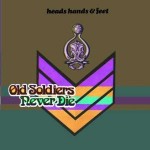 By Bill Lloyd
By Bill Lloyd
– During the late ’60s and early ’70s, the idea of a rock group being musically stronger than individual parts still felt like a happening trend. Not every lead singer or star guitarist had gone solo… yet. Even the dissolving Beatles made great music in between arguments. Some groups, however, never hit their commercial stride before the time came to pursue multiple musical careers. Such was the fate of the ever so talented collective from the U.K. called Heads, Hands and Feet.
Best known in the U.S. for being the band that brought Telecaster-master Albert Lee to light, the band also featured Charles “Chas” Hodges who later went on to fame and fortune with the comedy/musical duo, Chas and Dave in England. Lead singer Tony Colton has also had a long career in the music biz as a songwriter and producer (Jerry Lee Lewis and Yes are among acts he’s produced). Drummer Pete Gavin, keyboardist Mike O’Neill and guitarist Ray Smith rounded out the group that would most likely be labelled Americana today.
Musically, H, H & F covered a lot of ground. They could be funky like Little Feat and they could seamlessly mix country and R’n’B music into their sound, echoing groups like The Band or American Beauty-era Dead. Albert Lee and Tony Colton’s “Country Boy” later became a massive country hit for Ricky SKaggs. Lee’s stunning guitar work and songwriting can be heard throughout.
During the group’s active years 1970-1973 , they released only three albums. Their obvious talent and musical hybrid found quick critical acclaim but their sales, like many bands who had critical acclaim, were less than spectacular. Copies of their first two albums on Capitol can still be found in vinyl bins, as well as their third “Old Soldiers Never Die” on Atco, which was released after the band called it quits.
Internet shopping will surely lead you to CD reissues of these records for fans old and new. as well as a couple more posthumous releases. Heads, Hands and Feet is the kind of pop culture buried treasure worth digging up.
(Bill Lloyd is a respected solo artist and member of the reunited Foster and Lloyd.)
Tom Waits, Nikki Lane enter Americana chart
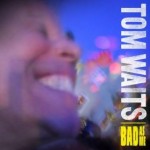 Ok, we’re all disappointed that in this week’s Americana Music Chart Will Hoge’s “Number Seven” jumped right past number seven to land in the sixth slot. There goes a perfectly good lead.
Ok, we’re all disappointed that in this week’s Americana Music Chart Will Hoge’s “Number Seven” jumped right past number seven to land in the sixth slot. There goes a perfectly good lead.
Vaulting into the chart at #12 this week is Tom Waits’ “Bad As Me.” Other new entries include Nikki Lane (very impressive at the Thirty Tigers event at the Americana Music Festival) at #24 with “Walk of Shame,” Dale Watson and the Texas Two’s “The Sun Sessions” at #31 and the Indio Girls'”Beauty Queen Sister” at #35.
The top of the chart remained stable, with the Jayhawks, Robert Earl Keen, Ryan Adams, John Hiatt and Ry Cooder remaining in the top fve slots.
Nov. 19: Americana Music Festival on Austin City Limits
 The national television debut of the Americana Music Festival is scheduled for Nov. 19 on Austin City Limits, which has released this show setlist, beginning with Emmylou Harris, Alison Krauss, Buddy Miller, Jerry Douglas and Don Was singing “I’ll Fly Away.”
The national television debut of the Americana Music Festival is scheduled for Nov. 19 on Austin City Limits, which has released this show setlist, beginning with Emmylou Harris, Alison Krauss, Buddy Miller, Jerry Douglas and Don Was singing “I’ll Fly Away.”
- The Avett Brothers – The Once and Future Carpenter
- Lucinda Williams – Blessed
- Amos Lee – Cup of Sorrow
- Elizabeth Cook- El Camino
- Justin Townes Earle – Harlem River Blues
- Jessica Lea Mayfield – For Today
- Buddy Miller – Gasoline and Matches
- The Civil Wars – Barton Hollow
- Candi Staton – Heart on a String
- Jim Lauderdale – Life by Numbers
- Robert Plant – Monkey
- Gregg Allman – Melissa
It captures the best moments of the evening, although we wish Hayes Carll had made the cut. Nashville area viewers were able to watch the full version live and in a couple of early morning repeats.
As we’ve noted, national television exposure is critical to the future growth of Americana music and there’s arguable no better showcase than Austin City Limits. Check your local PBS station for show times.
Let Us In: A Tribute to Linda McCartney
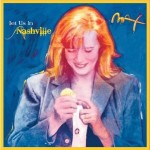 The “Let Us In” concert at the Ryman Auditorium tonight was billed as a fundraiser for the Women and Cancer Fund, so let’s begin with a link to their site and a way to donate to the cause.
The “Let Us In” concert at the Ryman Auditorium tonight was billed as a fundraiser for the Women and Cancer Fund, so let’s begin with a link to their site and a way to donate to the cause.
I’m sure it was a good cause, but it was also an odd evening. This was marketed as a tribute to Linda McCartney, and a concert featuring the music of Paul McCartney. Yet each guest artist was invited to perform his or her own material along with a pop classic written by Paul.
That meant McCartney’s music was at best just half of the evening, and there was very little flow to the show. Phil Vassar came out in a Sgt. Pepper-esque jacket, did one of his country hits, a reinterpretation of “Lady Madonna” and then an inexplicable version of “Help Me Make It Through the Night.” My thoughts exactly.
Not that it was a bad night. The artists, including former Wings guitarist Laurence Juber were all talented and earnest. It just felt like you were driving down the highway with someone who kept switching off the Beatles station to sample something on the pop country channel.
The Blue Sky Riders closed the show in a way that reflected the entire concert. We wrote here about the Blue Sky Riders’ debut last spring at the Tin Pan South Festival in Nashville. It’s a remarkable trio of singer-songwriters, including Kenny Loggins, Gary Burr and Georgia Middleman.
They did two original songs, including the anthemic “Dream,” and a lovely version of the rarely-heard “Junk,” from the first McCartney solo album. So far so good.
Their final song was “Help!,” a John Lennon song. Yes, we know that McCartney’s name was on the credits, but that was just the terms of the partnership.
As Lennon said of the song, “I just wrote the song because I was commissioned to write it for the movie. But later, I knew I was really crying out for help. So it was my Fat Elvis period.”
Most promising is a new CD out tomorrow featuring a selection of McCartney songs (no “Help!) bearing the same name as the concert.
Artists include Juliana Cole, Jeff Daniels, Kiki Dee, Tommy Emmanuel, Steel Magnolia, SheDaisy and more.
Reviews: Chris Altmann, Mary Johnson Rockers, Jill Jack
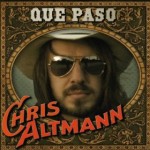 Over four days at the Americana Music Festival, review copies of albums can be as ubiquitous as business cards. A sampling of some of the most intriguing artists we came across:
Over four days at the Americana Music Festival, review copies of albums can be as ubiquitous as business cards. A sampling of some of the most intriguing artists we came across:
Australian artists were well-represented at the Americana Music Festival. Chris Pickering’s “Work of Fiction,” produced by Don Nix, was a dazzling collection of jangly pop and his fellow countryman Chris Altmann mines similar, if even more derivative territory, on “Que Paso.” You can play “spot the influence” all over this album. The first five seconds of “Other Side of the Mountain” brings to mind both “Dear Prudence” and “The Weight.” “Mucho Grande” recalls the best of Doug Sahm; “Love Like This” channels the Byrds and Flying Burrito Brothers and “Zig Zag Rag” smacks of Bob Seger. “Hard Tac” and “Bad News” rock with abandon and a bit of Elton John. Yes, it all sounds familiar, but it’s also a lot of fun. Altmann is inspired by the best and does his heroes justice on this energetic and entertaining album.
From North Carolina, Mary Johnson Rockers and the Spark have teamed up for “Hummingbird Heart,” an impressive eight-song collection that moves from lost sailor saga “Lucio” to the bluesy “Eyes on the Road” to the sweet and goofy love song “Ten Things.” But the title track eclipses all. It’s a stunning song about the premature birth of Rockers’ son Ty, and the challenges he faced. “Life is hard from the start with a hummingbird heart,” Rockers sings. Very touching.
Jill Jack’s “Songwriter Sessions” is an ambitious CD/DVD project, a live recording of all new material with a fine band and appreciative audience. The soaring love song “It’s You” is a highlight, as is the unlikely cover of “Wouldn’t It Be Loverly.” The project – and notably the bonus track “Northern Michigan” – remind us that there are vibrant music communities all over America, with talent to match.
Her new “Sunflower Girl” album is due in February.
New to chart: Billy Burnette, Red Molly and Kenny Vaughan
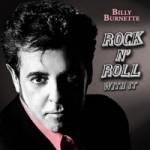 Nashville is well-represented on this week’s Americana Music Chart, as Music City guitarists Billy Burnette and Kenny Vaughan enter the list.
Nashville is well-represented on this week’s Americana Music Chart, as Music City guitarists Billy Burnette and Kenny Vaughan enter the list.
Burnette, the son of rockabilly legend Dorsey Burnette, and most recently a member of John Fogerty’s band, breaks in at #30 with “Rock ‘n’ Roll With It.”
Vaughan, a mainstay of Marty Stuart’s Fabulous Superlatives, is at #37 with “V.”
Red Molly’s “Light in the Sky,” one of the most added albums in Americana radio this week, is also new to the chart at #31.
As in past weeks, the top of the chart remained larglely unchanged, with the Jayhawks’ “Mocking Bird Time” at #1, followed by Robert Earl Keen’s “Ready for Confetti.”
Good health news from Jesse Winchester
Several months ago singer-songwriter, Jesse Winchester was diagnosed with cancer of the esophagus. Jesse is best known for his skilled songwriting and solo live performances. His debut 1970 self-titled album, produced by The Band’s Robbie Robertson, is widely regarded a classic today. His best known songs are “Yankee Lady”, “The Brand New Tennessee Waltz”, “Mississippi, You’re on My Mind”, and “Biloxi.” His songs have been recorded by various artists including Elvis Costello, Patti Page, The Everly Brothers, Fairport Convention, Joan Baez, Jimmy Buffet and Wynona Judd. His touring schedule will resume January, 2012. Here is the statement he recently posted on his website.
“Regarding my health: I have finished my treatment and surgery, and the doctors have sounded the “all clear.” I expect to be performing again early in the coming year. I want to thank precious Cindy and my children, the doctors and nurses who cared for me so lovingly and skillfully, and you, dear ones, for your prayers and good wishes. I can’t wait to see you again.”
(Terry Roland is an Americana-roots music journalist who has written interviews, reviews and feature articles for FolkWorks, Sing-Out, No Depression and The San Diego Troubadour.)
Review: Ry Cooder’s “Pull Up Some Dust and Sit Down”

by Terry Roland –
Ry Cooder’s latest release, Pull Up Some Dust and Sit Down, hearkens back to the salad days of his breakthrough album, 1972’s Into The Purple Valley, an ironically nostalgic ode to Central California during the Great Depression.
While that album was a wink and a grin about America’s past, an attempt to escape the political insanity of the Nixon era, which at the time came complete with the Vietnam war, Pull Up Some Dust and Sit Down is intent on staring down today’s socio-economic and political unrest.
Into The Purple Valley came from a place of innocent escapism after years of folk and rock protest; this album devotes itself to the lighter and somewhat brighter side of Ry’s own clear-eyed cynicism; it’s downright contagious.
Its insights and stabs at modern conservatism are not mean-spirited as much as pointedly satiric in a Randy Newman-influenced way. Although the two albums span three decades, they don’t sound all that different instrumentally, with Dust Bowl accordions and cleverly paced instrumentation, along with Ry’s familiar and soulful slide guitar work. He also chimes in on mandolin, mandola, bajo sexto and banjo.
Lyrically, he takes weighty subjects and casts them in a much-needed humorous light through quirky and seedy characterizations, infusing them with insightful street wisdom.Opening with the self-explanatory and potential anthem for the Occupation Movement, “No Banker Left Behind,” the pace is set for satiric playfulness.
The follow-up songs don’t disappoint, with such subjects as immigration, (“Quicksand”), the fundamentalist Evangelical Right,(“If There’s A God”) and the recent attacks on the American Labor Unions on the Tom Waits-like”I Want My Crown.”
Along with Woody Guthrie and Leadbelly, another influence is found on “John Lee Hooker for President.” Out of blues heaven, the legendary guitar player returns to earth to campaign for president. Of course, John Lee offers everyone in the nation,”one scotch, one bourbon and one beer” if they vote for him.
The most compelling track on the album is the antithesis of Woody Guthrie’s “This Land Is Your Land,” the melancholy closing song, “No Hard Feelings:”
“This land should have been our land/You took it for your land/You got a use for every stream and tree.”
But it ends on a hopeful note: “Try to live in harmony with old Mother Nature and you’ll remain in grace after you’ve gone.”
His playing on this album is pure Ry Cooder, gloriously off-center and unconventional as he slides, picks and soulfully sings his way through the aches and pains of life in 2011. His vocals have notably improved from his early ‘70s work, most likely a benefit of working with Dave Edmunds and John Hiatt in Little Village a couple of decades ago.
Strains of Latin,reggae, boss nova, ragtime and American blues all blend with a fresh celebration of life and the scent of L.A. street musical stew, with no small thanks to the players: an international and diverse group, including Flaco Jimenez on accordion, Arturo Gallardo on clarinet and alto sax, Ry’s son Joachim Cooder on bass and drums and Pablo Molina on sousa and alto horn. They manage to carry Ry’s musical vision, sometimes sustaining the mood of melancholy, sometimes screaming with righteous anger and sometimes just celebrating the funky joy ofthe blend they’ve discovered.
The new album leaves you with a feeling akin to hearing Nebraska, with some added musical flair and spice. Pull Up Some Dust represents the best of what a songwriter’s art should be capable of doing: entertaining, provoking and disturbing while it irresistibly makes you want to get up and dance.
(Terry Roland is an Americana-roots music journalist who has written interviews, reviews and feature articles for FolkWorks, Sing-Out, No Depression and The San Diego Troubadour.)
Review: Jason Boland & the Stragglers
 Rancho Alto, the new album from Jason Boland and the Stragglers, offers up traditional country music with a contemporary perspective.
Rancho Alto, the new album from Jason Boland and the Stragglers, offers up traditional country music with a contemporary perspective.
Although comparisons to George Strait and Merle Haggard are inevitable and appropriate, Boland also brings to mind a young Gordon Lightfoot, combining traditional sounds with a resonant voice and a strong sense of narrative.
There are stories laced throughout Rancho Alto, from the trapped miner in “Down Here in the Hole” to the sweet sentiments of “Mary Ellen’s Greenhouse.”
The songs are strong throughout, particularly the final two tracks.
“Forever Together Again” should be the last dance at the roadhouse, a “Tennessee Waltz” for a new generation: “Singers and dancers, late night romancers, good-timin’cowboys and girls are looking for trouble through tiny beer bubbles that burst when they hit the real world.”
The closer is Greg Jacobs’ “Farmer’s Luck, a song about a man who is about to lose his farm to a recreational lake project. It’s a stirring work, somehow melding heartbreak and eminent domain.
Jonell Mosser breaks into Americana music chart
 Jonell Mosser, one of our favorites, breaks into the Americana Music Association chart at #38 this week with “Fortunes Lost, Fortunes Told,” As we noted in our review of the album, Jonell is a stirring and soulful singer who has never had the break she deserves. Maybe that’s changing.
Jonell Mosser, one of our favorites, breaks into the Americana Music Association chart at #38 this week with “Fortunes Lost, Fortunes Told,” As we noted in our review of the album, Jonell is a stirring and soulful singer who has never had the break she deserves. Maybe that’s changing.
With the Jayhawks still at #1 with “Mocking Bird Time,” the only new entry in the top ten is Will Hoge’s “Number Seven” at #9.
Also new to the chart: The self-titled album from Whitehorse at #36 and Lera Lynn’s “Have You Met Lera Lynn?” at #39.
